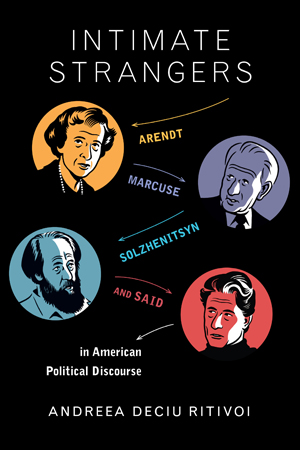Intimate Strangers: Carnegie Mellon's Andreea Deciu Ritivoi Analyzes Foreigners' Perspectives on American Politics in New Book
Contact: Shilo Rea / 412-268-6094 / shilo@cmu.edu
PITTSBURGH—Immigrants to new countries bring expectations, experiences and a different set of values and customs with them, which often allows them to see things from fresh viewpoints.
In the new book "Intimate Strangers in American Political Discourse," Carnegie Mellon University's Andreea Deciu Ritivoi analyzes foreigners' perspectives on American politics — and the critical challenges they face. Using four respected intellectual exiles as examples — Hannah Arendt, Herbert Marcuse, Alexander Solzhenitsyn and Edward Said — Ritivoi explores the benefits of their "stranger ethos" in order to improve political systems and societal problems.
 "I am interested in foreigners who are intellectual and became very interested and critical — but not dismissive — of American politics. Arendt, Marcuse, Solzhenitsyn and Said had a love-hate relationship with American society but wanted to make it better. There is a certain heroism in them because they were willing to take a huge risk by being critical of their adoptive country," said Ritivoi, professor of English in the Dietrich College of Humanities and Social Sciences.
"I am interested in foreigners who are intellectual and became very interested and critical — but not dismissive — of American politics. Arendt, Marcuse, Solzhenitsyn and Said had a love-hate relationship with American society but wanted to make it better. There is a certain heroism in them because they were willing to take a huge risk by being critical of their adoptive country," said Ritivoi, professor of English in the Dietrich College of Humanities and Social Sciences.
Ritivoi describes how Arendt, Marcuse, Solzhenitsyn and Said each steered major political schools of thought in American political discourse after World War II. Being a foreigner enabled them to argue and reason in certain ways. In an effort to convince their audiences that they were "American enough" to understand their new environment, they used precise rhetorical tactics and inspired radical new approaches to longstanding problems in American politics.
This leads to the concept of "stranger ethos," which Ritivoi describes as when a person deliberately tries to estrange themselves from everything familiar instead of accepting things the way they are.
"Immigrants teach us this because they practice it without thinking it, but politicians, teachers, parents and students should do it," Ritivoi said. "We can all engage in de-familiarization by simply refusing to take things for granted."
One aspect that surprised Ritivoi was how Arendt, Marcuse, Solzhenitsyn and Said were all revered in the U.S. in their respective fields but had their political views rejected often just because they were foreigners.
"It was shocking to discover that even highly educated people would dismiss a political view based on their country of origin. It shows how highly valued the notion of a 'native' is and creates 'the myth of the native born,' which assumes that only a native knows what a country needs," Ritivoi said.
Vladimir Tismaneanu, professor of politics at the University of Maryland, calls "Intimate Strangers" "a superb endeavor."
"This book is not only a major achievement in intellectual history but also a vibrant invitation to empathy, lucidity and moral clarity," Tismaneanu said.
"Intimate Strangers" was published by Columbia University Press. For more information, watch this short video: http://youtu.be/OfaVU-xCe_w.
###